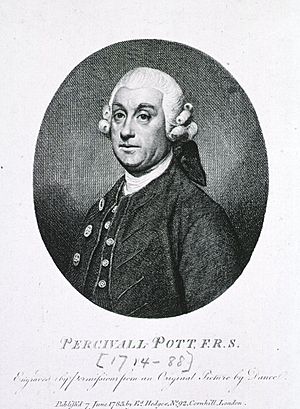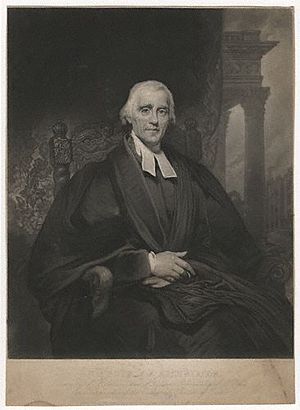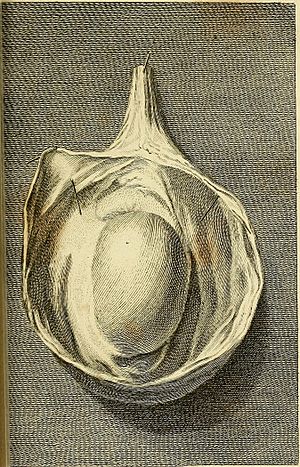Percivall Pott facts for kids
Percivall Pott (born January 6, 1714, in London – died December 22, 1788) was an important English surgeon. He helped create the field of orthopaedics, which deals with bones and muscles. He was also the first scientist to show that a type of cancer could be caused by something in the environment.
Contents
A Surgeon's Life and Discoveries
Percivall Pott's father died when he was young. However, Joseph Wilcocks, a bishop and a relative of his mother, paid for his schooling. Pott trained with Edward Nourse, a surgeon at St Bartholomew's Hospital. In 1736, he was allowed to practice as a surgeon. He became a full surgeon at St Bartholomew's Hospital in 1749 and worked there until 1787.
Pott was considered the best surgeon in England during his time. He brought in many new and better ways to do surgery. He helped stop the common use of harsh chemicals and burning tools in operations, making surgery safer.
In 1756, Pott broke his leg after falling from his horse. His injury was a very serious compound fracture of the tibia, which is the main bone in the lower leg. While he was hurt, he asked a servant to buy a door from a nearby building site. He was then carefully placed on the door and carried home. Surgeons thought about amputating his leg, which was a risky operation back then. But Pott insisted they splint his leg instead, and he fully recovered.
In 1769, Pott wrote a book called Some Few Remarks upon Fractures and Dislocations. This book was translated into other languages and had a big impact in Britain and France. He is also famous for describing a type of tuberculosis that affects the spine, which is now called Pott's disease.
Linking Soot to Cancer
In 1775, Percivall Pott made a groundbreaking discovery. He noticed that chimney sweeps often got a specific type of cancer on their scrotum. This cancer was later named chimney sweeps' carcinoma. Pott was the first person to connect a cancer to something in the environment, specifically chimney soot. He realized that the soot directly caused cancer on the skin.
His important work helped lead to the Chimney Sweepers Act 1788. This law aimed to protect young chimney sweeps. Later studies in 1933 showed that a chemical in soot, called benzo(a)pyrene, was indeed a cause of cancer. This chemical is also found in cigarette smoke and can cause other cancers. Pott's early research was very important for the study of how diseases spread, known as epidemiology.
In 1765, he was chosen to be the Master of the Company of Surgeons. This group later became the Royal College of Surgeons of England.
Family Life and Influence
Percivall Pott married Sarah Elizabeth Cruttenden in 1740. They lived in London and had five sons and four daughters.
People often described Percivall Pott as a person with excellent character. He was seen as a perfect example of an English surgeon. It is believed that his success and wealth helped improve the social standing of surgeons in society.
Pott also cared deeply about teaching his patients. He wrote many short papers, called pamphlets, about his observations on topics like "head injuries, hydrocele, fistula, rupture, and fracture." These pamphlets were very popular and helped share medical knowledge.
Percivall Pott's dedication to his patients and high standards of care earned him great fame. He is often considered one of the two greatest surgeons of the 18th century, along with his student John Hunter. In 1786, he was honored as the first Honorary Fellow of the Royal College of Surgeons of Edinburgh. He retired in 1787 and was named a governor of St Bartholomew's Hospital.
Chimney Sweepers' Carcinoma: Pott's Legacy
Percivall Pott greatly influenced medicine and our understanding of diseases. Many medical conditions are named after him, such as Pott's fracture (a type of ankle fracture), Pott's disease of the spine, and Pott's puffy tumor. However, the chimney sweeper's carcinoma, though not named after him, is a very important part of his legacy.
Pott's Approach to Public Health
Pott was not just a surgeon; he also cared about public health. He paid attention to the difficult lives of chimney sweeps. He wrote that young sweeps were often "treated with great brutality, and almost starved with cold and hunger." They were forced into "narrow, and sometimes hot chimneys, where they are bruised, burned and almost suffocated." He noted that when they grew up, they became very likely to get a "most noisome, painful, and fatal disease."
Pott's approach was special because he didn't just notice a link; he looked for the cause. His work helped later scientists figure out that soot was the agent causing the disease. He also noticed that young boys were most at risk for this cancer. Pott became famous for connecting job hazards to cancer, even though the full scientific reason wasn't known at the time. His book, Chirurgical Observations, provided a framework for understanding Occupational cancers today.
Lasting Influence
Percivall Pott's work led to a lot of new research and changes in public policies. After his first publication, more cases of scrotal cancer were reported. This led to a series of "Chimney Sweepers' Acts" in England. These laws aimed to protect young chimney sweeps. They also led to the creation of societies, like one in 1803, that worked to find new ways to sweep chimneys without using climbing boys.
Even with public demand for change, it took a long time for things to truly improve. Insurance companies and homeowners sometimes argued that the cancer was a small price to pay to protect homes from smoke and fires. While there was pressure for action as early as 1788, it wasn't until 1875 that Pott's work really started to make a difference. Around that time, the number of scrotal cancer cases and deaths began to decrease.
See also
 In Spanish: Percivall Pott para niños
In Spanish: Percivall Pott para niños
- Cancer cluster
- History of medicine
- History of surgery
- Pott disease
 | Kyle Baker |
 | Joseph Yoakum |
 | Laura Wheeler Waring |
 | Henry Ossawa Tanner |




